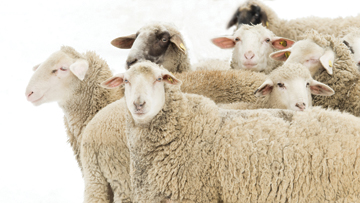You have free articles remaining this month.
Subscribe to the RP Witness for full access to new articles and the complete archives.
Perhaps the most historically memorable verse describing God’s people as His flock is Psalm 100:3. Psalters for centuries read, “We are His flock; He doth us feed.”
The problem is, the original language does not say we are His “flock.” Evidentally, the first printed English text of the psalter was rendered, “We are His folck.” This older English spelling of folk was apparently thought to be a misspelling of flock and was “corrected” by an uninformed printer. That mistake stuck, partly because the mistaken printing fits the context in which the verse calls us “the sheep of His pasture.” Its inclusion in the Scottish Metrical Psalter (1650) imparted to psalm singers the truth that we are God’s flock—even if a truth taught from the wrong text. The 20th Century correction of this error resulted in a passionate outcry from people who loved the old mistaken wording.
Accuracy in translation and the psalter’s correction is great gain for the people of God, but the church can—and should—passionately embrace the truth that we are God’s flock. The Scripture is replete with this metaphor, which teaches us richly about life and ministry in the church. Understanding that we are God’s flock teaches us about four profound needs.
1. We need God to be our Shepherd.
God raised up Abraham, Isaac, Jacob, Moses, and David from the shepherding profession to lead His people. God shepherded His flock through them (Ps. 77:20; 78:70-72), but human shepherds always failed (Jer. 10:21). Thus, God promised, “As a shepherd seeks out his flock when he is among his sheep that have been scattered, so will I seek out my sheep, and I will rescue them” (Ezek. 34:12). How did God fulfill this promise? He sent Jesus Christ—God in the flesh—to be our good Shepherd (John 10:11). As the good Shepherd, He laid down His life for the sheep. He saved them from sin, and He protects them from wolves. He knows His own and His own know Him.
The only way for us to be God’s flock is to have Jesus as our Shepherd. God’s flock today needs to draw near to Christ. We must hear His voice and call on Him in prayer amid the trials of life. Sheep need many things, but most of all they need the shepherd. In discipleship and friendship, we must point people to this overseer of their souls. The words of Psalm 23, “The Lord is my shepherd,” must become our words.
2. We need undershepherds to lead us on earth.
Jesus, the great Shepherd of the sheep (Heb. 13:20), appoints undershepherds—elders to represent Him and shepherd the flock. Elders are to pay careful attention to themselves and to all the flock (Acts 20:28-30; see Prov. 27:23). They must guard the flock from false teachers who are wolves, and they must feed Jesus’ lambs (John 21:15-17). They must shepherd by exercising oversight in the right spirit for the glory of the chief Shepherd (1 Pet. 5:1-4). We need elders who will love the flock, so churches must work more diligently to train such men, and members of Christ’s flock must learn to draw near to Jesus by drawing near to their elders.
3. We need other sheep to be brought into Jesus’ fold.
The idea of being in God’s flock may feel cozy, but we must remember that He has others to bring in (John 10:16). We should rejoice when God returns a straying sheep to Himself or when Jesus glorifies Himself by saving other lambs. Truthfully, life in God’s pasture becomes uncomfortable when new sheep are added. They don’t always smell the same, and they don’t always know how to behave. When new sheep are added to a sheepfold, time is spent establishing the new pecking order as lambs face off in a head-butting showdown. Rather than striving to retain a certain pecking order in the church, we need to readily receive new members of the fold and welcome them as those who bring glory to the shepherd.
4. We need to grow in our praises of our Shepherd.
Revelation 7:17 says of heaven, “For the Lamb in the midst of the throne will be their shepherd.” We rest assured of this reality because God has set our Shepherd on the throne. We should lift our voices in praise more and more singing the praises of our Shepherd who sits on the throne (Rev. 5:6-14). For eternity, we will praise Him who has taken us as the sheep of His pasture—even if we are not singing the exact words “we are His flock.”
James Faris | Second (Indianapolis, Ind.) RPC
